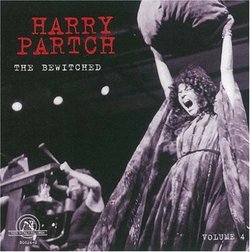| All Artists: Harry Partch, John Garvey, The University of Illinois Musical Ensemble, The Chorus of Lost Musicians Title: The Harry Partch Collection, Volume 4 Members Wishing: 4 Total Copies: 0 Label: New World Records Original Release Date: 4/4/2005 Release Date: 4/4/2005 Genre: Classical Styles: Ballets & Dances, Ballets, Chamber Music, Historical Periods, Classical (c.1770-1830), Modern, 20th, & 21st Century Number of Discs: 1 SwapaCD Credits: 1 UPC: 093228062424 |
Search - Harry Partch, John Garvey, The University of Illinois Musical Ensemble :: The Harry Partch Collection, Volume 4
 | Harry Partch, John Garvey, The University of Illinois Musical Ensemble The Harry Partch Collection, Volume 4 Genre: Classical
NEWLY REMASTERED FROM THE ORIGINAL MONO MASTER TAPES!!! *** The Bewitched was Partch's first work solely intended for dance (and mime-dance at that; he was not overly enamored in his lifetime of so-called "modern dance... more » |
Larger Image |
CD Details
Synopsis
Product Description
NEWLY REMASTERED FROM THE ORIGINAL MONO MASTER TAPES!!! *** The Bewitched was Partch's first work solely intended for dance (and mime-dance at that; he was not overly enamored in his lifetime of so-called "modern dance"). Drawing heavily from his deep affection for the music-theatrical performance traditions of Greek theater, as well as those from Africa, Bali, and Chinese opera, Partch conceived of a contemporary American music ritual-theater where musicians not only play, but also function at times as movers-singers-actors. Such is the case of The Bewitched, where the instruments are the set, in front of (and around) which dancers "dance," but where the onstage musicians also move and sing. "The Bewitched is in the tradition of world-wide ritual theatre. It is the opposite of specialized. I conceived and wrote it in California in the period 1952-55, following the several performances of my version of Sophocles' Oedipus. In spirit, if not wholly in content, it is a satyr-play. It is a seeking for release--through satire, whimsy, magic, ribaldry--from the catharsis of tragedy. It is an essay toward a miraculous abeyance of civilized rigidity, in the feeling that the modern spirit might thereby find some ancient and magical sense of rebirth. Each of the 12 scenes is a theatrical unfolding of nakedness, a psychological strip-tease, or--a diametric reversal, which has the effect of underlining the complementary character, the strange affinity, of seeming opposites." --Harry Partch

 Track Listings (12) - Disc #1
Track Listings (12) - Disc #1